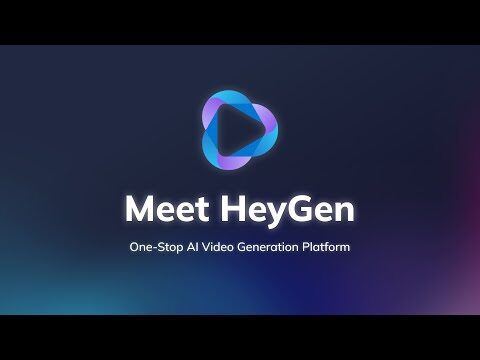Are you fascinated by Artificial Intelligence (AI) and its ever-growing applications in our world today? Would you like to get a more detailed understanding of all the layers that make up AI, from basic concepts such as Machine Learning to topics on current research projects and advances?
Look no further! Here is our curated list of the 7 best AI books for beginners and experts alike that will have you well-versed in technology’s most sought-after skill by 2023.
With a basic understanding of the history of AI and its future impact, these books provide readers with detailed insight into the technology’s advancements and laws regulating artificial intelligence – not to mention honing your skillset.
Table of Contents
- What are AI Books?
- What are the Best AI Books?
- Deep Learning (Adaptive Computation and Machine Learning Series) by Ian Goodfellow, Yoshua Bengio, and Aaron Courville
- Python: Beginner’s Guide to Artificial Intelligence (Dennis Rothman, Matthew Lamons, and Rahul Kumar)
- Artificial Intelligence Basics: A Non-Technical Introduction (Tom Taulli)
- Machine Learning (in Python and R) for Dummies (By John Paul Mueller and Luca Massaron)
- Introduction to Artificial Intelligence (By Philip C. Jackson)
- Human + Machine: Reimagining Work in the Age of AI (By Paul R. Daugherty)
- Life 3.0 Being Human in the Age of Artificial Intelligence (By Max Tegmark)
- What are the Benefits of Reading AI Books?
- Where Can I Get AI Books to Read?
- What are the Differences Between Human Intelligence and Artificial Intelligence?
- Conclusion
What are AI Books?
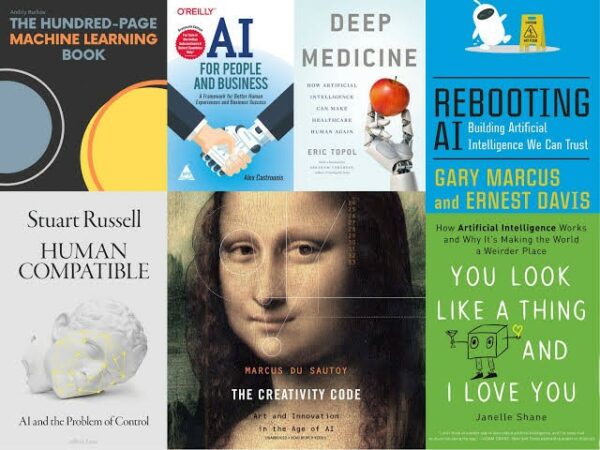
Artificial intelligence (AI) has quickly become a trending topic, and with that comes a plethora of literature on the subject. AI books can be considered literary guides into the world of AI, showcasing its potential, limitations, and impact on society.
These books can present complex technical concepts in an accessible manner to a wide range of readers, from beginners to experts in the field.
AI books can also serve as a practical guide to AI’s ethics and societal and philosophical implications, raising questions about how we should approach this rapidly evolving technology.
Whether you’re looking to learn about the history of AI, the latest breakthroughs, or ethical considerations, there’s an AI book out there for you.
What are the Best AI Books?
Artificial Intelligence (AI) has become one of the leading technologies in today’s world, used in various fields such as healthcare, finance, and transportation.
With the advent of AI, there has been a growing interest in understanding it better. Several AI books have been written on the subject, each with its unique perspective.
Some AI books focus on the technical aspects of AI, while others delve into the social and ethical implications and other potential consequences. If you are looking for the best artificial intelligence books, we’ve compiled a list of some of the best AI books to read.
These books present different viewpoints on AI and provide insights that will help you understand the field better.
Let’s get started!
Deep Learning (Adaptive Computation and Machine Learning Series) by Ian Goodfellow, Yoshua Bengio, and Aaron Courville
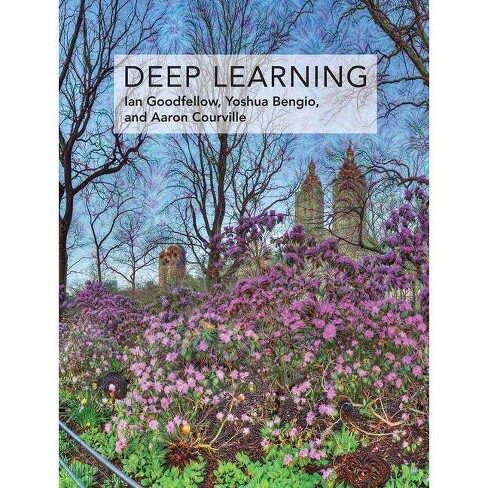
One of the most acclaimed books on artificial intelligence is “Deep Learning” by Ian Goodfellow, Yoshua Bengio, and Aaron Courville.
Whether you’re an aspiring AI practitioner or already working in the field, this comprehensive book covers everything you need to know about one of the most important subfields of machine learning.
With its clear explanations and numerous examples, “Deep Learning” gives readers a solid understanding of how artificial neural networks and other powerful tools extract meaningful patterns and insights from vast amounts of data.
Whether you’re interested in natural language processing, computer vision, or other AI applications, this book is an essential reference for anyone seeking to understand the world of deep learning.
Top Highlights from “Deep Learning”
- A complete introduction to neural networks and backpropagation algorithms
- Extensive coverage of cutting-edge techniques such as Generative Adversarial Networks (GANs) and reinforcement learning
- Comprehensive, accessible explanations of how all the components work together
- Numerous examples demonstrate how these powerful tools can extract meaningful patterns and insights from large datasets.
Python: Beginner’s Guide to Artificial Intelligence (Dennis Rothman, Matthew Lamons, and Rahul Kumar)
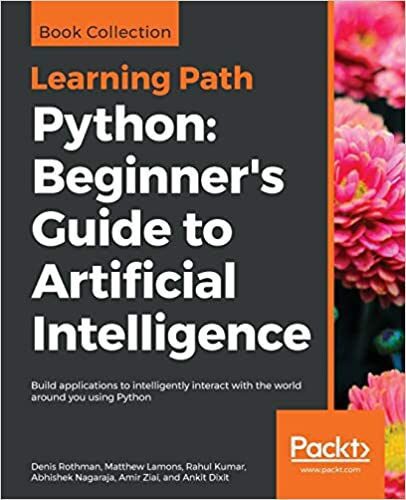
Python: Beginner’s Guide to Artificial Intelligence is an excellent resource for those just starting their journey into the fascinating world of AI.
Authored by Dennis Rothman, Matthew Lamons, and Rahul Kumar, the book is an essential guide that provides a comprehensive introduction to the basics of Python and AI.
The book is written in a clear and concise manner that is easy to understand, even for someone who has never written a line of code before. The authors have done an excellent job of breaking down complex concepts into bite-sized pieces, making it easier for readers to grasp the content.
This book is a must-read whether you want to get started with AI or improve your existing knowledge on the topic.
Top Highlights from “Python: Beginner’s Guide to Artificial Intelligence”
- Explains Python fundamentals and how it can be used in AI
- Introduces various algorithms used in machine learning
- Discusses tools and techniques for building AI-powered applications
- Includes real-world examples that demonstrate the practical application of AI principles
Artificial Intelligence Basics: A Non-Technical Introduction (Tom Taulli)
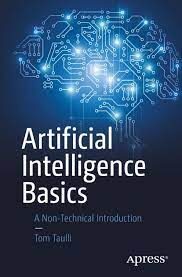
The book provides readers with an overview of the essential concepts related to AI, from machine learning algorithms and deep learning networks to natural language processing and computer vision. The book focuses on how these technologies are used in various industries, such as healthcare, finance, and logistics.
This is an excellent book for those who want to better understand AI without getting bogged down in technical terminology, making it one of the best AI books ever. Its straightforward explanations and clear examples make it the perfect guide for anyone wanting to get started with AI or broaden their knowledge.
Whether you’re a student, a professional, or just curious about AI, this book has something for everyone.
By the end of it, you will have an excellent understanding of how artificial intelligence works and its potential applications in various fields. This is an invaluable resource for anyone looking to get started with AI or learn more about it.
Top Highlights from “Artificial Intelligence Basics: A Non-Technical Introduction”:
- Provides a comprehensive and non-technical introduction to AI concepts
- Explains the fundamentals of machine learning algorithms, deep learning networks, natural language processing, and computer vision
- Includes real-world examples of how AI is currently being used in various industries
- Helps readers understand the potential applications of AI and how to use it in their projects.
Machine Learning (in Python and R) for Dummies (By John Paul Mueller and Luca Massaron)
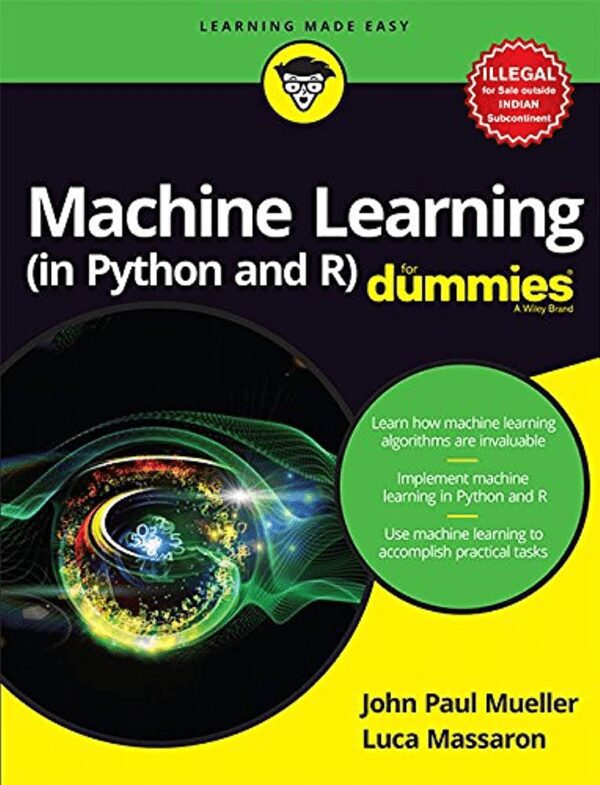
This book is excellent for those new to machine learning and who want to learn more about the basics. It explains the fundamentals of ML in an easy-to-understand way without getting into complicated technical details.
The authors also provide practical examples that use both Python and R codes, so you can practice coding as you learn. This book is a must-have resource for anyone who wants to understand the basics of ML and apply it to their projects.
With its clear explanations and well-structured examples, Machine Learning (in Python and R) for Dummies will help you gain a deeper understanding of ML and enable you to develop your applications.
Top Highlights from “Machine Learning (in Python and R) for Dummies”:
- Introduces ML fundamentals in an easy-to-understand manner
- Presents both Python and R code examples to practice coding as you learn
- Provides instructions on how to use popular machine learning libraries such as Scikit-learn and TensorFlow.
- Explains how to apply machine learning techniques to build practical applications.
Introduction to Artificial Intelligence (By Philip C. Jackson)

Introduction to Artificial Intelligence is one of the best AI books you can find online. It is an excellent guide for those new to AI. It provides a comprehensive introduction to the basics of AI and its applications in various fields, such as computer vision, natural language processing, robotics, and big data analytics.
The book has a clear structure that gradually builds on each concept and includes numerous illustrations to help readers understand the topics.
This book provides readers with an excellent overview of AI, from its history and development to modern applications. It is an excellent resource for anyone looking to learn more about AI and its potential uses in various industries.
By the end of it, you will better understand how AI works and be able to apply it to your projects. This is a must-read for anyone wanting to gain an understanding of AI or improve their existing knowledge.
Top Highlights from “Introduction to Artificial Intelligence”:
- Provides a comprehensive and non-technical introduction to AI topics
- Includes numerous illustrations and examples to help readers understand the material
- Explains the fundamentals of AI and its applications in various fields such as computer science and vision, natural language processing, robotics, and big data analytics
- Helps readers better understand AI and its potential applications.
Human + Machine: Reimagining Work in the Age of AI (By Paul R. Daugherty)
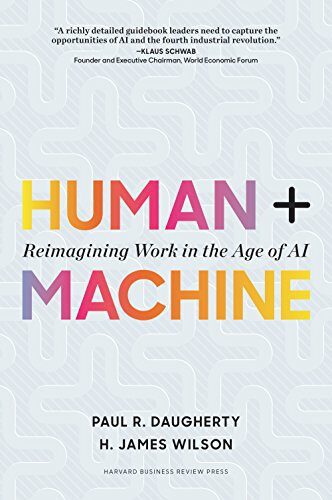
In his book “Human + Machine: Reimagining Work in the Age of AI,” Paul R. Daugherty explores how artificial intelligence (AI) is transforming the workforce and creating new opportunities for collaboration between humans and machines.
Daugherty argues that the key to success in the age of AI is to embrace a new mindset in which humans and machines work together to achieve better outcomes than either could achieve alone.
Drawing on examples from various industries, Daugherty shows how companies use AI to automate routine tasks, enhance decision-making, and even create new products and services.
Ultimately, “Human + Machine” is a thought-provoking exploration of how AI reshapes our daily life.
Top Benefits from “Human + Machine: Reimagining Work in the Age of AI”:
- The book explores how AI can transform the workforce and create new opportunities for collaboration between humans and machines.
- Describes how companies use AI to automate routine tasks, enhance decision-making, and even create new products and services
- Provides a thought-provoking exploration of how AI reshapes our work and lives
- Offers insight into the potential ethical issues raised by the rise of AI.
Life 3.0 Being Human in the Age of Artificial Intelligence (By Max Tegmark)
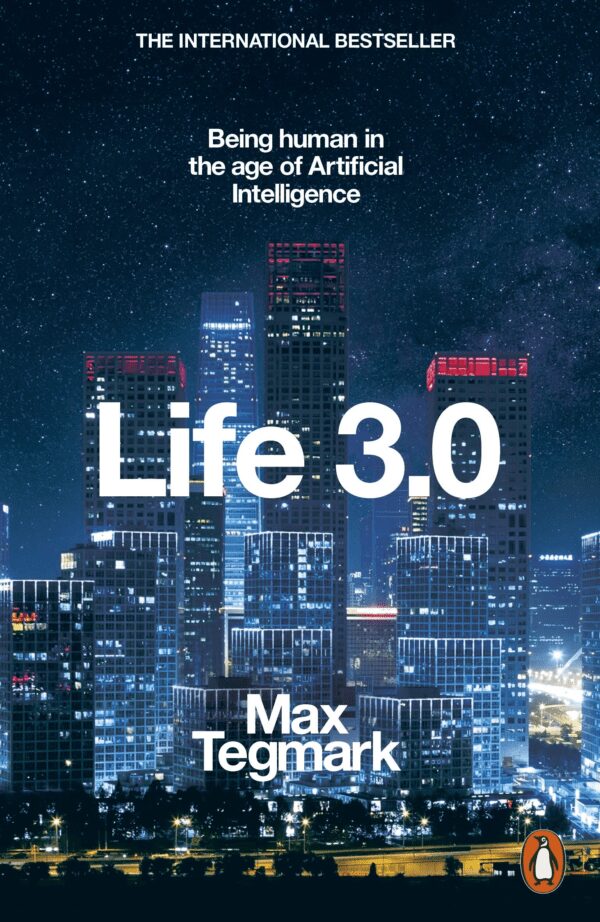
In “Life 3.0: Being Human in the Age of Artificial Intelligence,” Max Tegmark examines the potential implications of AI and offers a roadmap for navigating our future with technology.
Tegmark argues that, as AI advances, humans will need to take responsibility for our destinies by understanding the risks and opportunities posed by AI.
Tegmark examines various topics, from the dangers of superintelligence to the potential benefits of AI in healthcare, making it one of the best AI books. He also has ideas such as digital immortality and the creation of conscious machines.
Overall, “Life 3.0” is an insightful and thought-provoking exploration of how AI shapes our future and what it means for humanity.
Top Highlights from “Life 3.0: Being Human in the Age of Artificial Intelligence”:
- Examines potential implications of AI and offers a roadmap for navigating our future with technology
- Explores dangers posed by a superintelligence, as well as potential benefits of AI research in healthcare
- The book discusses ideas such as digital immortality and the creation of conscious machines.
- Provides an insightful and thought-provoking exploration of how AI shapes our future and what it means for humanity.
Other AI books to read in 2023:
- Neural Networks and Deep Learning by Charu C. Aggarwal
- Artificial Intelligence: Learning Automation Skills with Python by Chris Baker
- A First Course in Artificial Intelligence by Deepak Khemani
- Artificial Intelligence: A Modern Approach (3rd edition) by Peter Norvig and Stuart Russell
- Fundamentals of Machine Learning for Predictive Data Analytics – Algorithms, Worked Examples and Case Studies (The MIT Press) by John D. Kelleher and Brian Mac Namee
What are the Benefits of Reading AI Books?
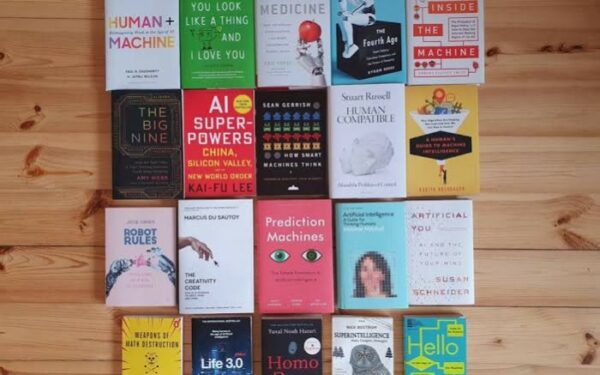
Reading AI books is an effective way to stay up-to-date with the latest developments in AI systems. With this information, you can understand how AI works and use it to your advantage in business and research.
In addition, reading AI books helps you learn about new algorithms and software tools that can be used for data analysis and machine learning. You can also get an in-depth look into the ethical implications of using AI and gain insights into its societal trends on society.
Overall, reading AI books provides a comprehensive understanding of the field and allows you to stay ahead of the curve when developing your applications or researching new technologies.
Where Can I Get AI Books to Read?
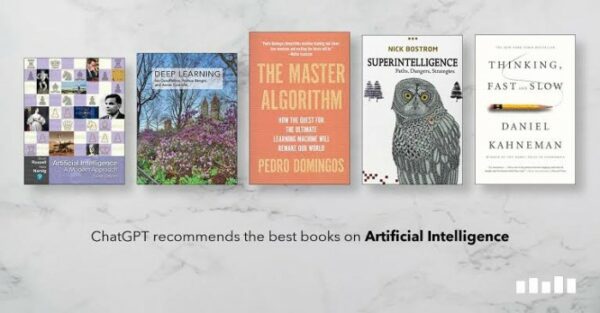
AI books can be found in many bookstores, libraries, and online retailers. Additionally, various websites offer free downloads and tutorials for those seeking more information about AI.
For those who prefer physical copies of books, Amazon is an excellent resource for finding new and used copies. Furthermore, many universities also have libraries that offer a wide selection of AI books.
Overall, many resources are available for those wanting to expand their knowledge of AI. By using the resources available, you can stay up-to-date on the latest developments in the field of artificial intelligence.
What are the Differences Between Human Intelligence and Artificial Intelligence?
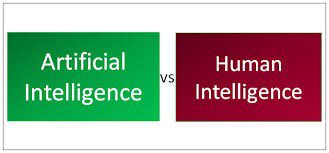
The primary differences between human and artificial intelligence are that AI is a machine-based system, while humans learn through experience. Artificial intelligence also has the ability to process information much faster than humans, allowing it to make decisions more quickly and accurately.
In addition, AI systems can operate autonomously without needing constant human monitoring or intervention. On the other hand, humans can still make decisions based on their experience and knowledge.
Overall, AI is a powerful tool that can automate tasks and processes more quickly and accurately than humans. However, it still lacks the complex decision-making capabilities of human intelligence. Therefore, both types of intelligence must be used in conjunction with one another to achieve the best results.
Conclusion
Reading books about artificial intelligence is an excellent way to gain knowledge and understanding of this rapidly growing technology.
With the right books, you can learn the fundamentals, explore real-world applications, and understand the differences between human intelligence and AI.
Whether a beginner or an experienced developer, reading AI books will give you the knowledge and skills needed to succeed.
By understanding artificial intelligence, we can gain a better insight into its potential implications for our future and what it means for humanity.
